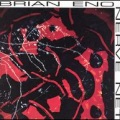
Nerve Net
by Rick AndersonFor the record, Nerve Net was not Brian Eno's first attempt at rock & roll. Not counting his time with Roxy Music, he also made several solo albums in the 1970s that were clearly intended as approaches to pop music -- they were sideways approaches, of course, shaped by the intellectual distance he has always kept between himself and the music that arises from the forces that he puts into motion, and they were far from unqualified successes. But this is his most rocking solo album in years, and also his funkiest. That's not say it's either funky or rock & roll, but it does manage to be lots of fun in a slightly inhuman, claustrophobically funky sort of way. The list of participants includes several of the usual suspects (Robert Fripp, Robert Quine, Roger Eno), as well as a few surprises (Benmont Tench, John Paul Jones) and a raft of unknowns. The sound, which doesn't vary much from track to track, is compressed and dense, with lots of heavily treated and synthesized percussion. On "What Actually Happened," for example, drummer Richard Bailey plays a distinctly organic funk part through what sounds like a battery of effects, while a bassist and guitarist do indistinguishable things and Eno messes around with everything and throws in samples. "Juju Space Jazz" features both Quine and Fripp (the latter credited with "early '50s club guitar") as well as Eno playing such instruments as "African organ" and "tenor fax" (har har). Overall, this album is quite fun but nothing to get too awfully excited about.
专辑歌曲列表
-
英语 大小:5.89 MB
-
英语 大小:5.03 MB
-
英语 大小:4.33 MB
-
英语 大小:3.51 MB
-
英语 大小:3.72 MB
-
英语 大小:4.1 MB
-
英语 大小:4.63 MB
-
英语 大小:3.89 MB
-
英语 大小:5.69 MB
-
英语 大小:8.94 MB
-
英语 大小:3.14 MB
-
英语 大小:3.89 MB
-
英语 大小:4.32 MB


